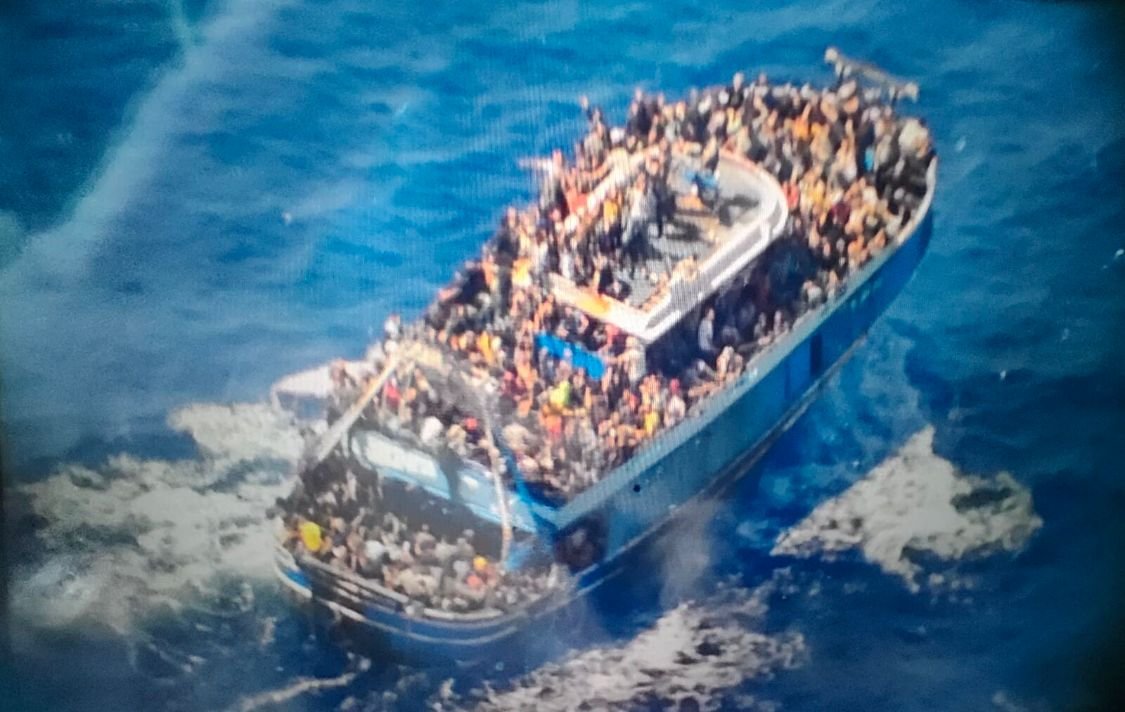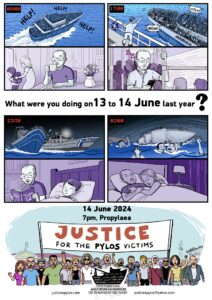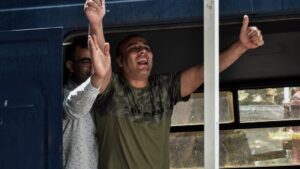Frontex Fundamental Rights Office Document Exposes Greek Authorities: Rescue was not their objective and was not initiated – They moved “too late” and only “when the vessel capsized” – Testimonies of capsizing due to towing.
We hereby re-post a document from the Frontex Fundamental Rights Office (FRA) regarding the tragic shipwreck in Pylos, which was leaked to the public, the form and content of which leave no doubt about its authenticity.
The entire document is available here and here.
In the document, Frontex seeks to deny any responsibility for the fatal shipwreck. However, concerning the Greek authorities, the document unveils the prolonged inaction of the Hellenic Coast Guard, formally tasked with the search and rescue operation, resulting in the sinking of the vessel with approximately 600 victims on June 14, 2023, off the coast of Pylos. The document leaves room for the possibility that the sinking may have been caused by the Coast Guard’s attempt to tow the vessel, citing the consistency in survivors’ testimonies.
Below, we highlight some key points from the section addressing the actions of the Greek authorities.
In summary, the document states:
- It is not known why the Greek authorities did not immediately launch a search and rescue operation after receipt of the Frontex sighting.
- Attempts to replenish the vessels’ supplies under the Greek authorities’ instructions increased the risk for the approximately 700 individuals aboard Adriana.
- The dangerous rocking of Adriana was likely recorded from aboard the Hellenic Coast Guard vessel PPVS 920.
- Attaching ropes to such an unstable vessel bore significant risks.
- The Adriana vessel drifted without a functioning engine for several hours, contrary to the Greek authorities’ claims.
- The resources mobilized by the Greek authorities were insufficient.
- Rescue was not the immediate focus of the Greek authorities prior to the shipwreck.
- The Greek authorities delayed launching the search and rescue operation (SAR) and initiated it only when the Adriana vessel capsized, by which time it was too late to save all the migrants.
- The Greek authorities did not make use of the resources offered by Frontex.
- Consistent migrant testimonies suggest that the capsizing of the Adriana resulted directly from the towing of the vessel by the Hellenic Coast Guard’s boat.
In detail, the document states (pages 15-16):
‘3. Assistance, search and rescue efforts by the Greek authorities
The determination of the state of the vessel, coordination or provision of assistance and potential declaration of a SAR operation were formally a responsibility of Piraeus JRCC. Frontex’ Fundamental Rights Office does not know how Piraeus JRCC monitored, assessed and arrived at the conclusion that a SAR case did not need to be launched immediately after the receipt of the Frontex sighting. The Greek authorities reported that they had managed to speak with the migrants via satellite phone at 11:00 UTC and twice more later still on 13/06/2023. The migrants reportedly rejected assistance and wanted to proceed to Italy.
The Greek authorities nevertheless determined that Adriana was in need of assistance and instructed (between 12:35 and 15:00 UTC; exact time unknown) commercial ships in the vicinity to provide assistance and supplies to Adriana. The two documented attempts were in fact unsuccessful and may have in some instance even increased the danger to the vessel. Especially the second attempt -by the “Faithful Warrior” -to provide food and water resulted in dangerous rocking of Adriana, which was likely recorded from aboard HCG CPV 920. This indicated early on that the connecting of ropes to the overcrowded and highly unstable ship bore significant risks. Altogether, the attempts of supplying water and food to all the 700 or so persons on Adriana failed as the vessels sent to support were ill-equipped for the task and risks related to them approaching and providing goods were not sufficiently considered.
Frontex’ Fundamental Rights Office considers that the state of the vessel and the migrants significantly deteriorated over the course of 13/06/2023 – their sixth day at sea. With attempted resupply interventions threatening to capsize their boat, the migrants likely refused to accept more help, as is in fact explained credibly in one of the survivors’ accounts reviewed by the Office.
Contradicting other sources, the Greek authorities described the periods the boat was adrift as quite short. Migrants’ accounts, on the other hand, mention that on 13/06/2023, Adriana’s engine had not been functioning for a number of hours towards the end of the day. This conclusion is also supported by the analysis of the sailing speed of one of the assisting commercial ships, evident from the reviewed vessel tracking records.
The Greek authorities stated that they never attempted to tow Adriana, although a rope had been thrown to the boat at one point from HCG CPV 920. The statement of the HCG is incompatible with some of the consistent accounts of the migrants.
The resources mobilized by the authorities during the day {including merchant vessels and HCG helicopters) were not sufficient for the objective of rescuing the migrants. Judging from the resources actually deployed, as well as based on some migrant testimonies, it appears that the authorities’ immediate focus prior to the shipwreck was not rescue.
Frontex’ Fundamental Rights Office reviewed repeated allegations from migrants’ testimonies that the capsizing of Adriana might have been directly caused by the attempt to tow it by HCG CPB 920. It does not, however, possess sufficient information to conclude on the immediate cause of the shipwreck or the attempt to tow the boat with certainty.
On the other hand, it appears clear, including from the statements released by the Greek authorities themselves, that the authorities declared the SAR operation only when the Adriana capsized – i.e. when it was too late to rescue all the migrants. In the hours prior to the shipwreck, the authorities deployed insufficient and inappropriate resources to assist the migrants considering the number of persons aboard Adriana. Finally, the Greek authorities failed to make use of the resources offered by Frontex.’
At the end (p. 16) the document concludes:
‘Frontex’ Fundamental Rights Office concludes based on the available information, that:
- At the time of initial sighting by Eagle 1, there was reasonable certainty that persons aboard Adriana were threatened by grave and imminent danger and required immediate assistance. The [responsible Frontex organ – redacted text] should, based on a reviewed assessment procedure, assess similar cases more thoroughly against the need to issue a Mayday alert, especially when the competent national authorities do not provide information about their assessment of the situation and follow-up steps, such as declaring the boat as being in distress or initiating a search and rescue operation.
[…]
- The Greek authorities appeared to have delayed the declaration of SAR operation until the moment of the shipwreck when it was no longer possible to rescue all the people on board, deployed insufficient and inappropriate resources considering the number of persons aboard Adriana, and failed to make use of the resources offered by Frontex. [emphasis added]
Frontex’ Fundamental Rights Office regrets that it was not given relevant information by the Greek authorities in response to its enquiry but expects to receive the results of two ongoing national judicial proceedings, as well as the Greek Ombudsman enquiry.‘




